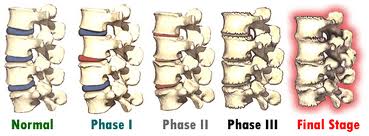How Chiropractic Care Prevents Degeneration of the Spine
 Spinal degeneration is a term that refers to the aging process of the spine. As a person ages, constant stress on the spine and untreated vertebral subluxations cause changes to the spinal cord. These changes affect the spinal discs, which degenerate due to fluid loss and tears; the discs then become thinner and less flexible and no longer provide a comfortable cushion between the vertebras. The supporting ligaments, tendons, and muscles also begin to weaken and the spinal bone curves as the result of deformation. The degeneration of the spine causes various problems, including pinched nerves, herniated discs, spinal stenosis, osteoarthritis, permanent nerve damage, and misalignment of the spine.
Spinal degeneration is a term that refers to the aging process of the spine. As a person ages, constant stress on the spine and untreated vertebral subluxations cause changes to the spinal cord. These changes affect the spinal discs, which degenerate due to fluid loss and tears; the discs then become thinner and less flexible and no longer provide a comfortable cushion between the vertebras. The supporting ligaments, tendons, and muscles also begin to weaken and the spinal bone curves as the result of deformation. The degeneration of the spine causes various problems, including pinched nerves, herniated discs, spinal stenosis, osteoarthritis, permanent nerve damage, and misalignment of the spine.
Phase One
The early stage of spinal degeneration presents no symptoms, and therefore few patients seek treatment for it. In many cases, the first phase of spinal degeneration begins in the patients 20s or 30s. However, most do not realize that the spine is misaligned because these vertebral subluxations do not cause any pain for the first few years. At this stage, which can last between 10 and 20 years, the spine loses some of its natural curvature and the joints, discs, and nerves experience some stress that causes them to age at an accelerated rate. Regular chiropractic care is ideal at this stage, as the body responds best to chiropractic adjustments in the early stages of spinal degeneration.
Phase Two
In phase two of the spinal degeneration process, which can last for another 20 years, patients begin to experience increased neck pain and back pain. During this stage, the discs are thinner, the spinal cord has narrowed, and bone spurs have formed. The patient’s posture is typically affected by now. Chiropractic care is still effective for many patients at this point, and patients suffering from signs of spinal degeneration should schedule regular chiropractic adjustments to improve spinal balance and relieve spinal stress.
Phase Three
By the time spinal degeneration has progressed to stage three, more invasive treatment may be needed to address spinal problems; however, regular chiropractic appointments can still be beneficial and help to delay the degeneration process. In this stage, patients experience a change in posture, nerve damage, more serious disc problems, and deformation of the bones.
Phase Four
By the time degenerative spinal disease has hit stage four, patients’ quality of life is impacted. Chronic pain, reduced range of motion, numbness or paralysis, and poor balance can make it difficult for patients to attend to daily tasks. In phase four, many patients will require a more aggressive treatment plan, which may include routine chiropractic adjustments to provide some relief of symptoms. However, at this stage, spinal degeneration is irreversible and our main goal is keeping patients as comfortable as possible.
Chiropractic care with Dr. Nathen Horst is highly successful at reversing spinal degeneration in its early stages. We encourage men and women to schedule regular chiropractic adjustments as early as their 20s and 30s to prevent early aging of the spine. Those that are at risk of spinal degeneration, including those who engage in heavy lifting or other strenuous activity on a regular basis, will especially benefit from chiropractic care.
Contact Horst Chiropractic in Temecula to schedule an appointment with us.


